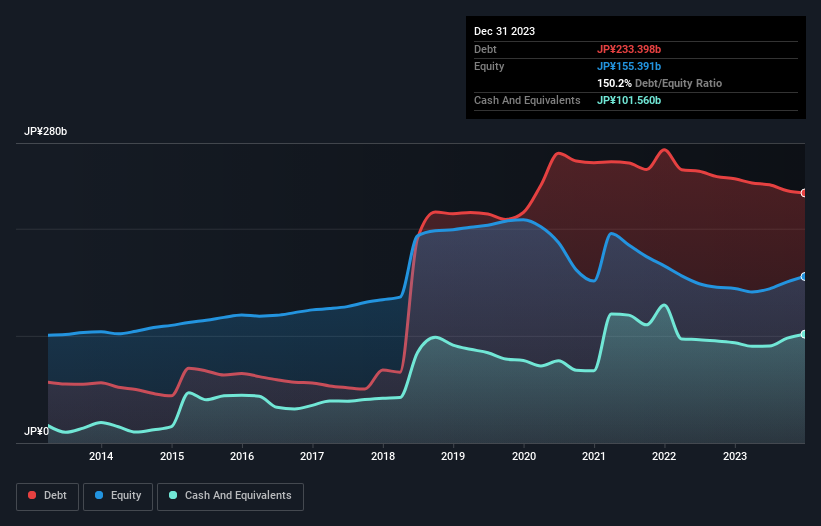
Howard Marks put it nicely when he said that, rather than worrying about share price volatility, 'The possibility of permanent loss is the risk I worry about... and every practical investor I know worries about.' It's only natural to consider a company's balance sheet when you examine how risky it is, since debt is often involved when a business collapses. We can see that Japan Airport Terminal Co., Ltd. (TSE:9706) does use debt in its business. But is this debt a concern to shareholders?
When Is Debt A Problem?
Debt and other liabilities become risky for a business when it cannot easily fulfill those obligations, either with free cash flow or by raising capital at an attractive price. If things get really bad, the lenders can take control of the business. However, a more frequent (but still costly) occurrence is where a company must issue shares at bargain-basement prices, permanently diluting shareholders, just to shore up its balance sheet. By replacing dilution, though, debt can be an extremely good tool for businesses that need capital to invest in growth at high rates of return. The first thing to do when considering how much debt a business uses is to look at its cash and debt together.
Check out our latest analysis for Japan Airport Terminal
What Is Japan Airport Terminal's Net Debt?
The image below, which you can click on for greater detail, shows that Japan Airport Terminal had debt of JP¥233.4b at the end of December 2023, a reduction from JP¥246.6b over a year. On the flip side, it has JP¥101.6b in cash leading to net debt of about JP¥131.8b.

How Strong Is Japan Airport Terminal's Balance Sheet?
According to the last reported balance sheet, Japan Airport Terminal had liabilities of JP¥56.3b due within 12 months, and liabilities of JP¥245.6b due beyond 12 months. Offsetting these obligations, it had cash of JP¥101.6b as well as receivables valued at JP¥22.8b due within 12 months. So its liabilities total JP¥177.5b more than the combination of its cash and short-term receivables.
Japan Airport Terminal has a market capitalization of JP¥556.9b, so it could very likely raise cash to ameliorate its balance sheet, if the need arose. However, it is still worthwhile taking a close look at its ability to pay off debt.
In order to size up a company's debt relative to its earnings, we calculate its net debt divided by its earnings before interest, tax, depreciation, and amortization (EBITDA) and its earnings before interest and tax (EBIT) divided by its interest expense (its interest cover). This way, we consider both the absolute quantum of the debt, as well as the interest rates paid on it.
With net debt to EBITDA of 2.7 Japan Airport Terminal has a fairly noticeable amount of debt. But the high interest coverage of 8.1 suggests it can easily service that debt. We also note that Japan Airport Terminal improved its EBIT from a last year's loss to a positive JP¥22b. There's no doubt that we learn most about debt from the balance sheet. But ultimately the future profitability of the business will decide if Japan Airport Terminal can strengthen its balance sheet over time. So if you want to see what the professionals think, you might find this free report on analyst profit forecasts to be interesting.
Finally, while the tax-man may adore accounting profits, lenders only accept cold hard cash. So it's worth checking how much of the earnings before interest and tax (EBIT) is backed by free cash flow. During the last year, Japan Airport Terminal generated free cash flow amounting to a very robust 84% of its EBIT, more than we'd expect. That puts it in a very strong position to pay down debt.
Our View
Happily, Japan Airport Terminal's impressive conversion of EBIT to free cash flow implies it has the upper hand on its debt. But truth be told we feel its net debt to EBITDA does undermine this impression a bit. It's also worth noting that Japan Airport Terminal is in the Infrastructure industry, which is often considered to be quite defensive. All these things considered, it appears that Japan Airport Terminal can comfortably handle its current debt levels. Of course, while this leverage can enhance returns on equity, it does bring more risk, so it's worth keeping an eye on this one. There's no doubt that we learn most about debt from the balance sheet. However, not all investment risk resides within the balance sheet - far from it. For instance, we've identified 1 warning sign for Japan Airport Terminal that you should be aware of.
At the end of the day, it's often better to focus on companies that are free from net debt. You can access our special list of such companies (all with a track record of profit growth). It's free.
New: Manage All Your Stock Portfolios in One Place
We've created the ultimate portfolio companion for stock investors, and it's free.
• Connect an unlimited number of Portfolios and see your total in one currency
• Be alerted to new Warning Signs or Risks via email or mobile
• Track the Fair Value of your stocks
Have feedback on this article? Concerned about the content? Get in touch with us directly. Alternatively, email editorial-team (at) simplywallst.com.
This article by Simply Wall St is general in nature. We provide commentary based on historical data and analyst forecasts only using an unbiased methodology and our articles are not intended to be financial advice. It does not constitute a recommendation to buy or sell any stock, and does not take account of your objectives, or your financial situation. We aim to bring you long-term focused analysis driven by fundamental data. Note that our analysis may not factor in the latest price-sensitive company announcements or qualitative material. Simply Wall St has no position in any stocks mentioned.
About TSE:9706
Japan Airport Terminal
Primarily engages in the management of passenger terminal buildings in Japan.
Solid track record with mediocre balance sheet.


